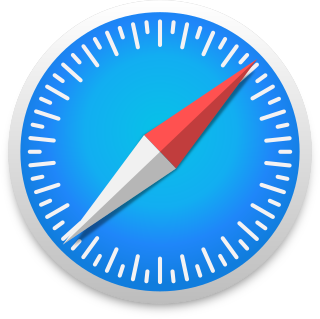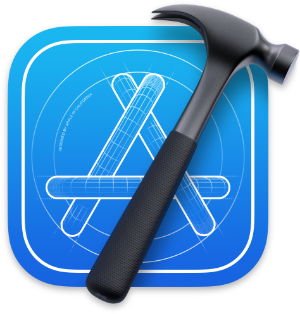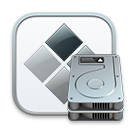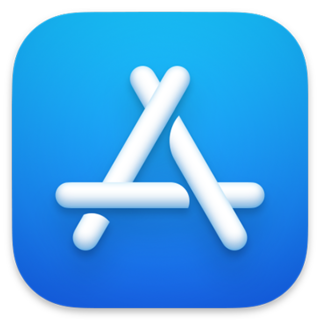
macOS is an operating system developed and marketed by Apple Inc. since 2001. It is the primary operating system for Apple's Mac computers. Within the market of desktop and laptop computers, it is the second most widely used desktop OS, after Microsoft Windows and ahead of Linux.
QuickTime is a discontinued extensible multimedia architecture created by Apple, which supports playing, streaming, encoding, and transcoding a variety of digital media formats. The term QuickTime also refers to the QuickTime Player front-end media player application, which is built-into macOS, and was available for download on Windows until 2016.

Mac OS X Server is a discontinued series of Unix-like server operating systems developed by Apple Inc. based on macOS. It provided server functionality and system administration tools, and tools to manage both macOS-based computers and iOS-based devices, network services such as a mail transfer agent, AFP and SMB servers, an LDAP server, and a domain name server, as well as server applications including a Web server, database, and calendar server.
The history of macOS, Apple's current Mac operating system formerly named Mac OS X until 2011 and then OS X until 2016, began with the company's project to replace its "classic" Mac OS. That system, up to and including its final release Mac OS 9, was a direct descendant of the operating system Apple had used in its Mac computers since their introduction in 1984. However, the current macOS is a UNIX operating system built on technology that had been developed at NeXT from the 1980s until Apple purchased the company in early 1997.

Safari is a web browser developed by Apple. It is built into Apple's operating systems, including macOS, iOS, and iPadOS, and uses Apple's open-source browser engine WebKit, which was derived from KHTML.

iLife is a discontinued software suite for macOS and iOS developed by Apple Inc. It consists of various programs for media creation, organization, editing and publishing. At various times, it included: iTunes, iMovie, iPhoto, iDVD, iWeb, and GarageBand. Only iMovie and GarageBand remain and are now freely available on Apple's Mac App Store. iDVD and iWeb have been discontinued while iTunes and iPhoto have been succeeded by Music and Photos respectively.

Sherlock, named after fictional detective Sherlock Holmes, was a file and web search tool created by Apple Inc. for the PowerPC-based "classic" Mac OS, introduced with Mac OS 8 as an extension of the Mac OS Finder's file searching capabilities. Like its predecessor, Sherlock searched for local files and file contents, using the same basic indexing code and search logic found in AppleSearch. Sherlock extended the system by enabling the user to search for items through the World Wide Web through a set of plug-ins which employed existing web search engines. These plug-ins were written as plain text files, so that it was a simple task for a user to write a Sherlock plug-in.

Xcode is Apple's integrated development environment (IDE) for macOS, used to develop software for macOS, iOS, iPadOS, watchOS, tvOS, and visionOS. It was initially released in late 2003; the latest stable release is version 15, released on September 18, 2023, and is available free of charge via the Mac App Store and the Apple Developer website. Registered developers can also download preview releases and prior versions of the suite through the Apple Developer website. Xcode includes command-line tools which enable UNIX-style development via the Terminal app in macOS. They can also be downloaded and installed without the GUI.

iWork is an office suite of applications created by Apple for its macOS, iPadOS, and iOS operating systems, and also available cross-platform through the iCloud website.

Mac OS X Leopard is the sixth major release of macOS, Apple's desktop and server operating system for Macintosh computers. Leopard was released on October 26, 2007 as the successor of Mac OS X 10.4 Tiger, and is available in two editions: a desktop version suitable for personal computers, and a server version, Mac OS X Server. It retailed for $129 for the desktop version and $499 for Server. Leopard was superseded by Snow Leopard in 2009. Leopard is the final version of macOS to support the PowerPC architecture as Snow Leopard functions solely on Intel based Macs.

In 2005 and 2006, Apple switched the CPUs of Mac and Xserve computers from PowerPC to the x86 architecture from Intel.

A Hackintosh is a computer that runs Apple's Macintosh operating system macOS on computer hardware not authorized for the purpose by Apple. This can also include running Macintosh software on hardware it is not originally authorized for. "Hackintoshing" began as a result of Apple's 2005 transition to Intel processors, away from PowerPC. Since 2005, many Mac computers have used the same x86-64 computer architecture as many other desktop PCs, laptops, and servers, meaning that in principle, the code making up macOS systems and software can be run on alternative platforms with minimal compatibility issues. Benefits cited for "Hackintoshing" can include cost, ease of repair and piecemeal upgrade, and freedom to use customized choices of components that are not available in the branded Apple products. macOS can also be run on several non-Apple virtualization platforms, although such systems are not usually described as Hackintoshes. Hackintosh laptops are sometimes referred to as "Hackbooks".

Boot Camp Assistant is a multi boot utility included with Apple Inc.'s macOS that assists users in installing Microsoft Windows operating systems on Intel-based Macintosh computers. The utility guides users through non-destructive disk partitioning of their hard disk drive or solid-state drive and installation of Windows device drivers for the Apple hardware. The utility also installs a Windows Control Panel applet for selecting the default boot operating system.
Parallels Desktop for Mac is software providing hardware virtualization for Macintosh computers with Intel processors, and since version 16.5 also for Apple silicon-based Macintosh computers. It is developed by Parallels, since 2018 a subsidiary of Corel.

Mac OS X Snow Leopard is the seventh major release of macOS, Apple's desktop and server operating system for Macintosh computers.
Two major families of Mac operating systems were developed by Apple Inc.

OS X Lion, also known as Mac OS X Lion, is the eighth major release of macOS, Apple's desktop and server operating system for Mac computers.

The App Store is a digital distribution platform for macOS apps, often referred to as Mac apps, created and maintained by Apple Inc. The platform was announced on October 20, 2010, at Apple's "Back to the Mac" event. Apple began accepting app submissions from registered developers on November 3, 2010, in preparation for its launch.












